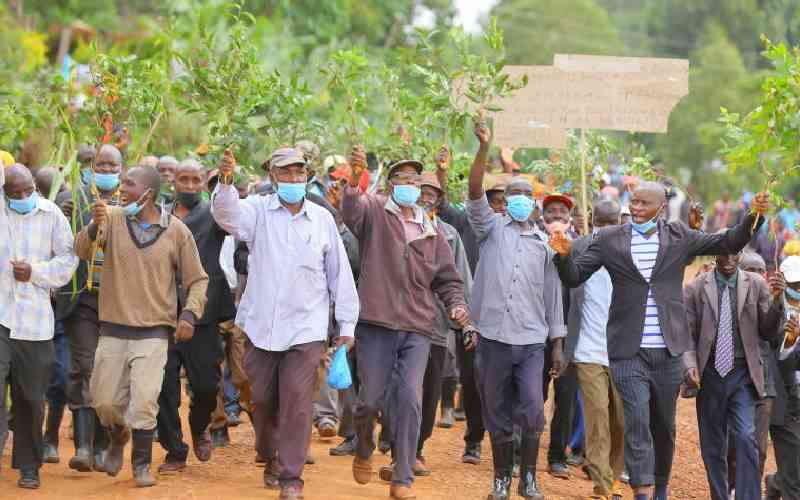By XN Iraki
Kenyans live under the long shadow of fear. In politics, they fear that there will be post election or even pre-election violence. They fear "their person" will not be the next president. Economically, they fear there will drought, they fear that prices of essential commodities will go up. They fear there will be no jobs for their children graduating from high schools and universities.
In their homes they fear for their security, with affluent hiding under fences that are getting reinforced either with live electric wires or razor wires, commonly found in battle zones.
There are emotional fears, too. Families live in fear of disintegration, parents fear that in the name of development, their children will become irresponsible, not live to their expectations. There are fears that the old order may not be replaced with a better order.
A new fear is gripping the younger generation, the fear of being discriminated now that it seems inevitable that tribes and gender, not necessarily meritocracy will be the determinants of who gets jobs, not just in the public sector, but private sector too. I fear that one day, a government official will come demanding evidence of tribal balance in my firm.
Other fears emanate from our history. We fear that historical grudges may not be resolved peacefully. Land issues emanating from colonial era may not be resolved amicably and some communities’ leadership in entrepreneurship and politics may be hard to reverse.
Others fear that decolonisation may return only in subtle ways, not through gun boats. The political and constitutional changes we are implementing serve as good opportunities for anyone interested in furthering strategic interests.
Political mileage
Living in the long shadow of these fears, is not healthy for our economy. How do we shorten it?
Some political leaders are currently using fear to gain political mileage.
Fear affects the economy by forcing investors to post their decisions. In past elections, entrepreneurs have lost and they fear, that could be repeated. Postponed investment means lost jobs and taxes.
Fear raises the risk premiums, resulting in higher interest rates and down spiral in investments. We are seeing rise in interest rates because of anxiety over the polls.
Fear keeps entrepreneurs at home; they fail to invest in regions and sectors with the highest returns. Without overcoming fear we would not be talking about multinational corporations, or even past empires like British or Roman.
Fear might be what makes Kenyan multinationals so rare. We prefer to colonize every town and city with kiosks. Once the Koreans and Japanese and other Asian countries including China shed off fear, they ventured into the world, spawning familiar brands like Samsung, Toyota, Daewoo, Haier, Tata and others.
Some have argued that increased crime in some parts of the country has a lot do with the fear of venturing outside the counties after repeated violence during elections that saw property and businesses lost.
Stay informed. Subscribe to our newsletter
Constrained at home, young people turn on each other, or drown their sorrow in alcohol or more recently suicides. Some argue boldly that the popularity of devolution and "tribal balances in jobs" is anchored on fear of each other.
Retarded economy
Fear, more than any other factor has retarded our economic growth. We have never been bold enough to overcome our fear. We learn to be fearful from home to school. Parents would rather reprimand a child who tampers with the TV instead seeing a budding engineer.
Our education makes our children fear failure, which is defined by grades. By the time we mature, fear has been instilled in us.
Yet the most important virtue we should bring out of school is not grades, but self confidence, fearlessness tempered with reason.
 The Standard Group Plc is a
multi-media organization with investments in media platforms spanning newspaper
print operations, television, radio broadcasting, digital and online services. The
Standard Group is recognized as a leading multi-media house in Kenya with a key
influence in matters of national and international interest.
The Standard Group Plc is a
multi-media organization with investments in media platforms spanning newspaper
print operations, television, radio broadcasting, digital and online services. The
Standard Group is recognized as a leading multi-media house in Kenya with a key
influence in matters of national and international interest.
 The Standard Group Plc is a
multi-media organization with investments in media platforms spanning newspaper
print operations, television, radio broadcasting, digital and online services. The
Standard Group is recognized as a leading multi-media house in Kenya with a key
influence in matters of national and international interest.
The Standard Group Plc is a
multi-media organization with investments in media platforms spanning newspaper
print operations, television, radio broadcasting, digital and online services. The
Standard Group is recognized as a leading multi-media house in Kenya with a key
influence in matters of national and international interest.









